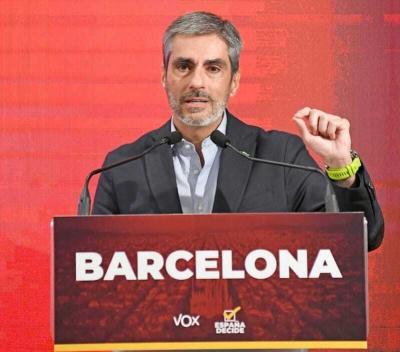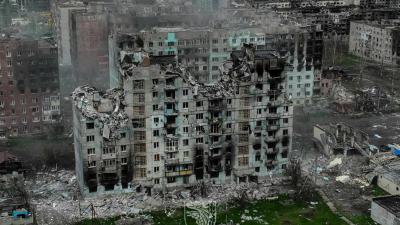Interview with Gonzalo de Oro, VOX councillor in Barcelona City Council and coordinator of the VOX municipal group. Gonzalo de Oro is a financial advisor and asset manager, as well as a real estate agent (API) and real estate legal expert. He has more than twenty years' experience in banking, where he has held management positions in several institutions. Since 2012 he has been a partner and COO of a wealth consultancy. He is also an entrepreneur, having created several digital businesses in the fashion, sports and health sectors. He has also been co-owner of a restaurant company.
Álvaro Peñas: VOX has entered the Barcelona city council with two councillors. Did you expect this result given VOX’s success in the Catalan elections?
Gonzalo de Oro: Yes, the expectations were good, but we were not sure that we would achieve such result. We have to be aware that at the time of the Catalan elections the procés (the push of the separatist parties for Catalonian independence) was in full swing and many saw us as necessary. However, now that everything is calmer, some people have not gone to vote or have voted for other options to oust the mayor of Barcelona Ada Colau. Moreover, we had everything against us: we ran a campaign without a budget while the others had public money; we were not allowed to participate in any debate because we were not in the city council; we were totally ignored by the media, meaning that we were not presented as befitting the third largest party in Spain and the fourth largest in Catalonia. I was only given two interviews, by decision of the Electoral Board, on TV3 and Barcelona TV, which were more like a pitched battle. There was also a party, Valens, a spin-off of Ciudadanos, whose electoral programme was a copy of VOX’s and, to top it off, with a candidate who was a novice in politics. However, we won two councillors and came within a hair’s breadth of winning a third one. Our brand is very strong and I think we have run a great campaign, given the means at our disposal.
Why has Barcelona become the most degraded city in Spain?
Because all the bad things have been concentrated here. However, this is a process that has been going on for a long time, since Xavier Trías was elected mayor. Not because he was particularly bad, but because it was during his term of office that the procés commenced and Barcelona’s decline began. Money and investments began to disappear; I can give you my own example, I worked for a company which had important foreign clients, and then we went from having 25 clients to zero in one year. The procés caused closures of businesses, flight of companies and huge social divisions that still exist. The arrival of Ada Colau was a catastrophe, because she is a woman who supports communist and anarchist ideas - in other words, everything that can destroy a city. And she is also a separatist, a low-profile one, but still a separatist. Colau has made Barcelona one of the most insecure cities in Europe and the Mecca of squatting, with neighbourhoods you can’t enter at night, like Raval, full of drugs and prostitution. Colau’s eight years have left Barcelona a dirty, unsafe and sad city.
I have heard what you have just said from many people, but the truth is that Ada Colau was elected again as the mayor and still has a lot of support. Who votes for Colau?
Unfortunately, Barcelona and Catalonia are different from the rest of Spain. First, the parties loyal to the Constitution are divided, then there is the declared separatism, and finally covert separatism represented by Ada Colau and the Socialist Party, the PSC, which claims to be loyal but is not. Over these years I have not spoken to anyone who was going to vote for Colau, although I have spoken to people who had voted for her. There has even been a useful vote for Junts (separatist centre-right) and the PSC to oust Colau, but in the end her policies will be maintained.
By the hand of the PSC.
Yes, there were two options: first the separatist candidate of Junts, Trías (although in my opinion he is not a true separatist), and on the other hand the covert separatist from the PSC, Jaume Collboni. For this reason, because they are both separatists, we have not supported either of them. The Popular Party wanted to score a goal by supporting the new mayor, Collboni, who by the way has refused to put the Spanish flag in his office, to avoid a separatist government. Yet what Collboni has done is to keep all of Colau’s top officials and I believe that she will enter the city government after the elections. Collboni is also a sectarian, as he showed in his inauguration as mayor when he said he was going to govern for all Barcelonians, except for those who had voted for VOX. This is the reality.
You mentioned earlier that many consider the procés to be over. The image from outside is that it has lost strength, that there are fewer of them, but at the same time they are more radical.
That is true. The problem with pro-independence movement is that if you do not fight against it, it is becoming stronger and stronger, which is why it makes me laugh when the Popular Party says that it is better not to do anything so as not to be a “factory of pro-independence supporters”. On the contrary, during the transition there were only 2% independence supporters, and now there are almost 50%, which shows that the PP still does not understand anything. This is why what they have done has not worked, and has been nothing more than feeding the monster with public money.
In separatism there are many disappointed people, people who believed in the dream of independence that they had been sold but then have come face to face with reality. And, on the other hand, those who still believe in it have become radicalised, as is the case with Junts. while ERC (Catalonian Republican Left), for agreeing with Sánchez in Madrid, is branded a traitor party. Separatism is divided, but it still has the capacity to mobilise the street.
In the absence of sedition crime, and with the possible formation of a government at the national level of PP and VOX, do you think a coup attempt like in 2017 could be repeated?
I don’t think so, because separatism is, emotionally, very touched. They have carried out the procés with all the money in the world, with all the means, with education in schools, with a weak state… and they have not succeeded. If in that context they were not able to win, they will be even less able to win now, when they have less popular support. With a PP-VOX government, the streets will probably burn, but more from the Left than from separatism, which is divided and weakened. This does not mean, as some people think, that the problem is over, for a very long term work is needed, I am talking about generations, to reverse this situation.
You speak of generations. To solve the problem of separatism, should we start with education?
Of course. To give you an example, my son was taught the history of Spain from the Catholic Monarchs to the Treaty of Utrecht, the three most important centuries of our history in two or three classes. And, of course, when they told him about the discovery of America, they told him that the Spaniards had gone there to rape women and steal gold. These lies, repeated a thousand times, have permeated society and changing that situation requires in the long term a radical change in education, because the damage they have done is so great.
And who would be willing to make that change?
In Catalonia there is only VOX; the PP has bought all the mantras of separatism and has made the historic mistake of allowing itself to be seduced by the bourgeoisie and has lost many voters it had on the left. In Barcelona they vote for us in the richest neighbourhoods, which feel Spanish and want order and security, and in the poorest neighbourhoods, which suffer from crime and squattering. In Torre Baró, which is the poorest neighbourhood in Barcelona, we got 20% of the vote, only behind the PSC, and we cannot fail them because if VOX does not defend them, no one else will.
In addition to crime and squattering, another growing problem in Catalonia is Islamisation. Separatism has favoured the arrival of immigrants who do not speak Spanish, and now the consequences are being paid for.
Yes, there are towns, such as Salt, El Vendrell or Manresa, where almost 30% of the population is immigrant and Muslim. We are the gateway to Europe and we are not aware of what this means, besides the fact that for the political class this immigration is very positive and they support it. We have seen this with the promotion of Arabic in Catalan schools or in municipal posters in Barcelona written in Arabic and Catalan, but not in Spanish. The denial of the problem has even led to separatists voting for us in some towns, and in Ripoll a separatist party against immigration has been established. It is a growing problem and there is no point in ignoring it.
Read also
Time for AUR?
According to the latest polls, the Alliance for the Union of Romanians (AUR), born in 2019, would be the first choice for the majority of Romanians in the next European elections, and could win up to 12 MEPs.
Álvaro Peñas
Just Another War of Conquest
No “denazification”, no protection of minorities, no NATO... the invasion of Ukraine is a war of conquest. The existential threat to Russia is the existence of a Ukrainian state.
Álvaro Peñas
“The demonstrations in Georgia are not going to slow down because we know what is at stake”: An interview with Nona Mamulashvili
The only way to defeat them is through elections, but when almost the entire state is in the hands of an oligarchy, you need enormous support to be able to reverse the situation.














Comments (0)